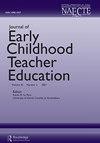“本土”拉丁教育路径:幼儿教师教育的挑战与可能性
IF 1.3
Q3 EDUCATION & EDUCATIONAL RESEARCH
Journal of Early Childhood Teacher Education
Pub Date : 2023-09-21
DOI:10.1080/10901027.2023.2257145
引用次数: 0
摘要
摘要本研究强调了一个重要的案例,可以作为机构合作伙伴关系的方案和概念模型,寻求通过“本土”拉丁教师使幼儿教育(ECE)教学专业多样化。本案例研究探讨了在一所地区性公立四年制大学参加ECE项目的拉丁裔学生的经历,这些学生参加了他们所在高中和/或当地社区大学的“自己种植”(GYO)项目。以学生为中心的定性案例研究探讨了:GYO拉丁裔教师候选人在转入四年制大学教师教育项目时遇到了哪些障碍?他们如何理解和应对这些挑战,以改善幼儿教师教育项目在大学层面扩展和转变GYO计划的方式,以支持拉丁裔教师候选人的保留和持续成功,我们能从中学到什么?通过访谈和焦点小组的结合,以及拉丁裔批判理论,这项研究表明,一旦进入大学,GYO拉丁裔学生就会面临日益增加的经济压力、教师教育的入学要求和通勤问题。在所有访谈中,都强调了建立一个批判性学习社区的重要性,在这个社区中,可以以文化可持续和基于地方的方式培养关系。披露声明作者未报告潜在的利益冲突。Pseudonym.2。我们承认,这篇文章发表时,“拉丁裔”和“墨西哥裔”的标签正受到挑战,以更好地反映交叉性身份,特别是性别流动和性别不一致的个人。我们已经看到了这个术语的各种迭代,包括(但不限于)Latinx和Latinx/a/o。我们赞赏这些努力,并认识到需要(重新)想象我们的语言来反映交叉的经验。然而,我们也希望确保我们这样做的方式,以那些将受到代表性标签变化影响最大的人为中心。我们决定在这里使用拉丁语,但要谨慎行事,因为我们继续努力,如何最好地代表这个多面民族-种族社区中经验的复杂性。我们使用颜色回避来代替色盲,色盲是这种意识形态的更传统的术语,它:(1)将失明等同于无知的假设问题化,这种假设不准确地传达和扭曲了盲人与世界互动的独特方式;(b)重新思考并删除我们在工作的各个方面,特别是在研究和学术方面,为实现社会正义而明确努力的ableist语言(Annamma, Jackson, & Morrison, Citation2017)。DACA是一项行政救济,旨在保护在儿童时期来到美国的符合条件的移民不被驱逐出境。DACA给予无证移民:1)保护他们不被驱逐出境,2)工作许可。该计划要求DACA身份和工作许可每两年更新一次。见https://www.uscis.gov/DACA。本文章由计算机程序翻译,如有差异,请以英文原文为准。
“Homegrown” Latinx educator pathways: the challenges and possibilities for early childhood teacher education
ABSTRACTThis study highlights a critical case that can serve as a programmatic and conceptual model for institutional partnerships seeking to diversify the early childhood education (ECE) teaching profession with “homegrown” Latinx teachers. The case study explored the experiences of Latinx students in an ECE program at a regional, public 4-year university who participated in a Grow Your Own (GYO) program at their high schools and/or local community college. The student-centered qualitative case study addressed: What obstacles have GYO Latinx teacher candidates experienced as they transferred to a 4-year university teacher education program? What can we learn about how they made sense of and responded to these challenges for improving the way in which early childhood teacher education programs might extend and transform GYO initiatives at the university level to support the retention and continued success of Latinx teacher candidates? Using a combination of interviews and focus groups, and Latinx Critical Theory, this study demonstrated that once at the university, GYO Latinx students struggled with increased financial strain, entrance requirements into teacher education, and commuting. Stressed across the interviews was the importance of building a critical learning community, in which relationships could be nurtured in culturally sustaining and place-based ways. Disclosure statementNo potential conflict of interest was reported by the author(s).Notes1. Pseudonym.2. We acknowledge that this article comes at a time when the label “Latino” and “Chicano” is being challenged to better reflect.intersectional identities, particularly gender fluid and gender non-conforming individuals. We have seen various iterations of theterm, including (but not limited to) Latinx and Latinx/a/o. We applaud these efforts and recognize the need to (re)imagine our language to reflect intersectional experiences. Yet, we also want to make sure we do so in a way that centers those that will be most affected by the change in representative labels. We have decided to use Latinx here but do so cautiously as we continue to wrestle with how best to represent the complexity of experiences within this multifaceted ethno-racial community.3. We use color-evasive in lieu of color-blind, the more traditional term for this ideology to (a) problematize an assumption that equates blindness with ignorance that inaccurately conveys and distorts the unique way blind individuals interact with the world; and, (b) rethink and remove ableist language as core to our explicit efforts toward social justice in all aspects of our work, particularly in research and scholarship (Annamma, Jackson, & Morrison, Citation2017).4. DACA is an administrative relief that protects eligible immigrants who came to the United States when they were children from deportation. DACA gives undocumented immigrants: 1) protection from deportation, and 2) a work permit. The program requires that the DACA status and work permit be renewed every two years. See https://www.uscis.gov/DACA.
求助全文
通过发布文献求助,成功后即可免费获取论文全文。
去求助
来源期刊

Journal of Early Childhood Teacher Education
EDUCATION & EDUCATIONAL RESEARCH-
CiteScore
2.20
自引率
16.70%
发文量
27
期刊介绍:
The Journal of Early Childhood Teacher Education, the official journal of the National Association of Early Childhood Teacher Educators, publishes original manuscripts, reviews, and information about association activities. Its purpose is to provide a forum for consideration of issues and for exchange of information and ideas about research and practice in early childhood teacher education. JECTE welcomes research reports, position papers, essays on current issues, reflective reports on innovative teacher education practices, letters to the editor and book reviews.
 求助内容:
求助内容: 应助结果提醒方式:
应助结果提醒方式:


